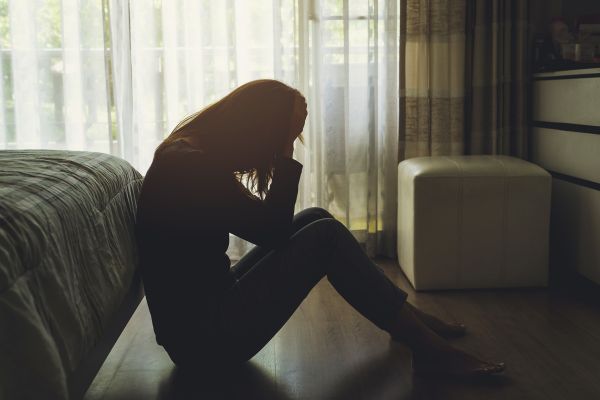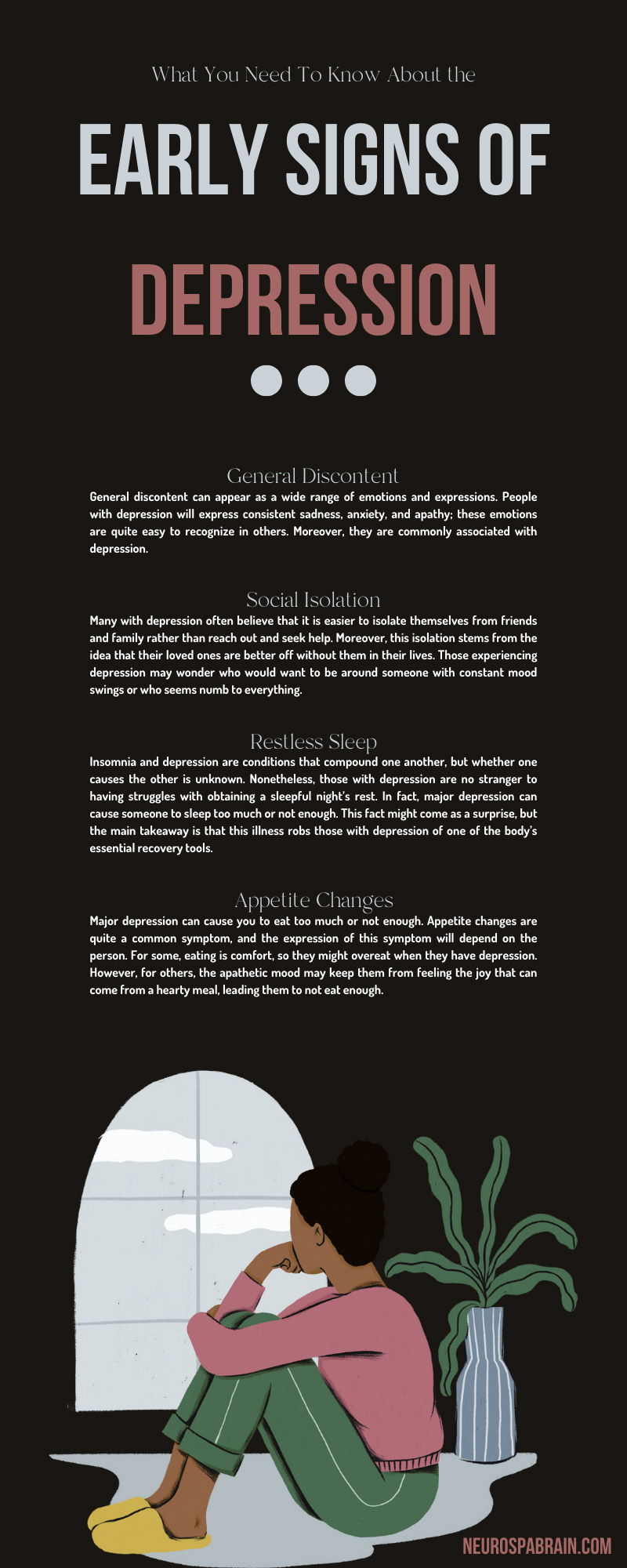
It might surprise you to know that there are countless people across the globe living with depression. In fact, some suffer in silence, not knowing if there is a name for their affliction. There is nothing worse than feeling as though you are completely alone in your pain.
To know that there are people who feel this way is heartbreaking; if only they knew they weren’t alone. These people might be closer to you than you think—or even in your mirror.
Knowing this shouldn’t frighten you, however. Help is available. The first step is recognizing the signs of early depression. Read on to explore what common symptoms of depression look like.
Knowledge Reduces Stigma
If you are unfamiliar with what it means to have depression, that is OK. When discussing this topic, the first thing we must do is completely define what it is, as to not mistake it for what it isn’t. Having an understanding of this experience is crucial as it reduces the harsh stigma against depression and allows us to understand it from a medical perspective. When we gain knowledge about this condition, we can view it as the valid illness it is.
Not a Choice
Many people use the term “depression” to refer to feeling sad or having a difficult day. Depression, as an illness, is so much more than that general term people use to describe fleeting unhappiness. Depression is insidious, pervasive, and invisible.
The inability to see depression gives room for naysayers who believe it isn’t real, suggesting it’s a choice or something that one can tackle with a “pull yourself up by your bootstraps” mentality. However, if that were the case, we would expect to see the eradication of this mental illness, not extreme prevalence. So, what is depression?
Defining Depression
Depression is an umbrella term for a group of mental conditions that affect a person’s mood. The most common types of depression are clinical, persistent depressive, Bipolar I or II, and postpartum depression. Many symptoms overlap, and one would need a medical healthcare professional to help them pinpoint which type they might have.
It’s essential to focus on the early signs of clinical depression as it is a common mental illness with broad symptoms that many of the other types share. The purpose here is not for self-diagnosis but rather to educate yourself on the symptoms to help you seek treatment as soon as possible.
Clinical Depression
Clinical depression, also known as major depression, is a persistent alteration to one’s general disposition. Clinical depression can drastically change one’s mood, interests, and behaviors. What was once an enjoyable and exciting hobby or activity now feels dull and lifeless. If you don’t suffer from clinical depression, it can be quite challenging to understand it or relate to the ways in which depression impacts all aspects of daily life.
Imagine floating deep out at sea with nothing but water all around you, with no boat or buoy to grab onto. You will feel desperate to hold on to anything and eventually exhaust yourself trying to fight so hard when it’s much simpler to let go. That is a general description of how depression can feel for some, but how does this illness look?
General Discontent
General discontent can appear as a wide range of emotions and expressions. People with depression will express consistent sadness, anxiety, and apathy; these emotions are quite easy to recognize in others. Moreover, they are commonly associated with depression.
However, another mood symptom that some may not realize is a sign of depression is anger, agitation, and mood swings. When someone is on the receiving end of this behavior, they might assume the person is simply being rude for no reason. Unfortunately, this happens often and can cause the person suffering to withdraw within themselves so as not to take their emotions out on others.
Social Isolation
That leads us to another common symptom of depression: social isolation. Many with depression often believe that it is easier to isolate themselves from friends and family rather than reach out and seek help. Moreover, this isolation stems from the idea that their loved ones are better off without them in their lives. Those experiencing depression may wonder who would want to be around someone with constant mood swings or who seems numb to everything.
Depression gives one a deep sense of hopelessness, and thus those experiencing it imagine themselves as being beyond help. They don’t realize that their friends and family love and care deeply for them and would want to know what is going on.
Restless Sleep
Insomnia and depression are conditions that compound one another, but whether one causes the other is unknown. Nonetheless, those with depression are no stranger to having struggles with obtaining a sleepful night’s rest. In fact, major depression can cause someone to sleep too much or not enough. This fact might come as a surprise, but the main takeaway is that this illness robs those with depression of one of the body’s essential recovery tools.
Appetite Changes
Major depression can cause you to eat too much or not enough. Appetite changes are quite a common symptom, and the expression of this symptom will depend on the person. For some, eating is comfort, so they might overeat when they have depression. However, for others, the apathetic mood may keep them from feeling the joy that can come from a hearty meal, leading them to not eat enough.
Lack of Concentration
Depression can cloud the mind and cause a lack of concentration that can negatively affect one’s ability to do their job or schoolwork proficiently. No amount of grit, self-will, or consequences can rile someone up to get the work done, no matter how important it is. Lack of concentration due to depression can be significantly debilitating when we consider how important it is for us to do our jobs and work. Depression can cause one to lose their job or drop out as bosses and professors write off the person as lazy and uncaring even though they are anything but.
Seeking Help
The brain is an ever-changing and unique organ that can express mental illness in a myriad of ways. Living with depression is much more personal than we can ever understand. Nearly 280 million people live every day with depression, and some might not even be aware they have it. That lack of awareness is why it’s vital to know the signs and symptoms of depression—understanding depression allows us to seek help for ourselves or others.
Are you looking for depression treatment in Orange County, California? Neurospa is happy to help you find healing and freedom. We offer FDA-approved, non-invasive, and non-medicinal treatment for depression, anxiety, and more.


